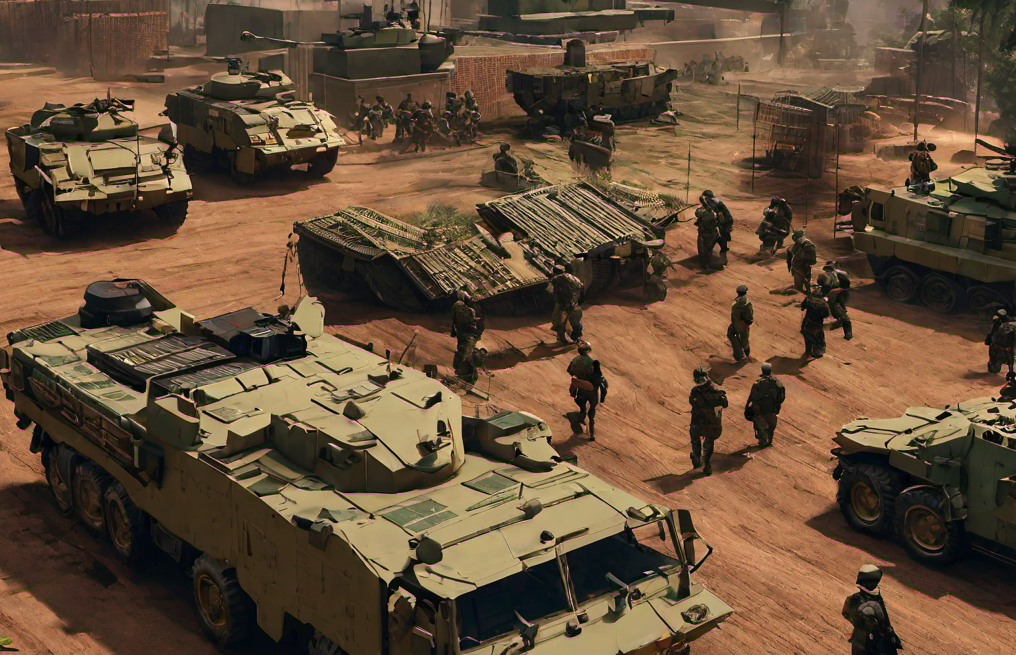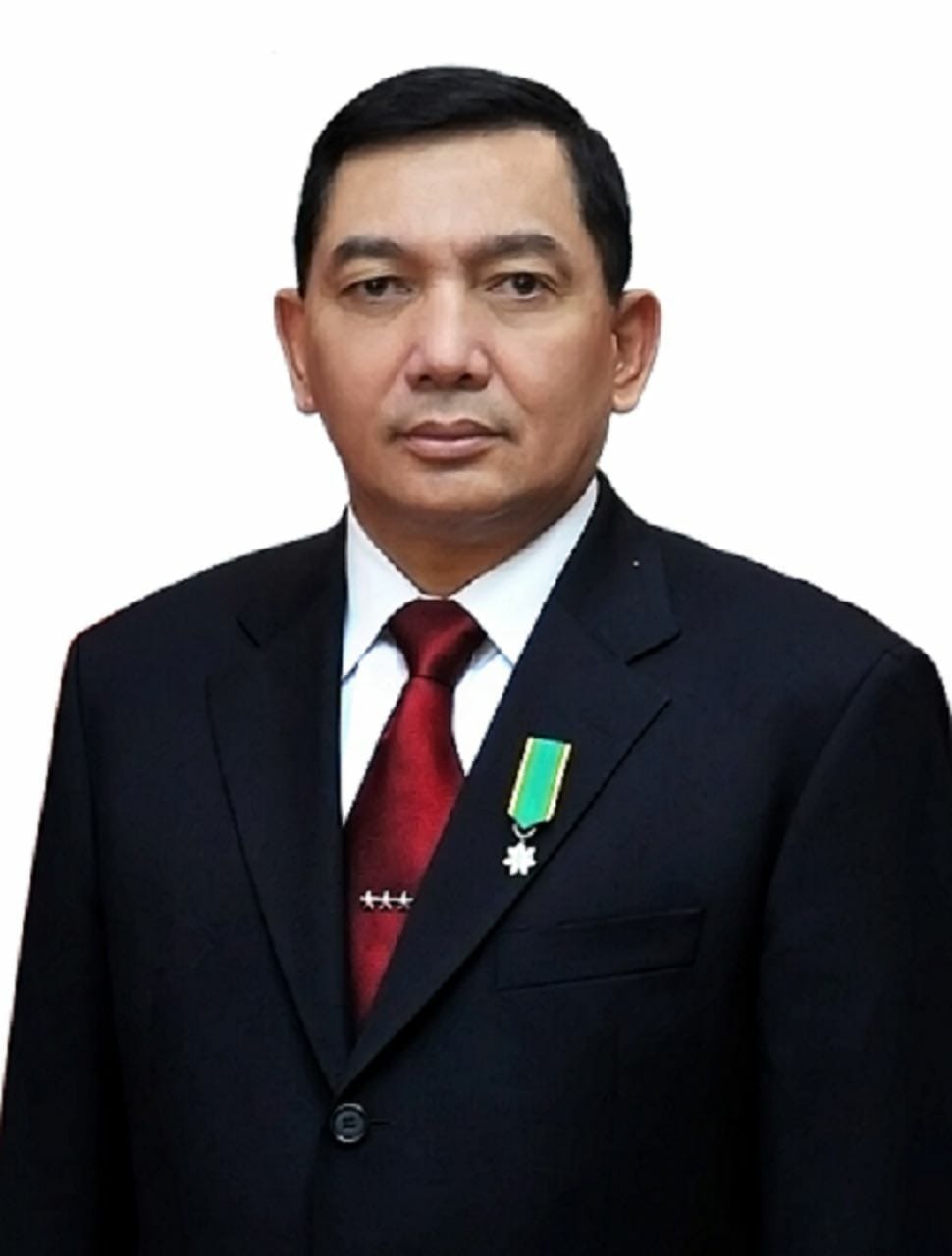Author : Sjafrie Sjamsoeddin

Generated by AI Gencraft
Introduction
Military-civilian cooperation in the defense industry has become an increasingly relevant topic in today’s global security context. Changes in the complex and dynamic security landscape have prompted countries worldwide to seek new ways to strengthen their defense capabilities through collaboration between the civilian and military sectors. As a country with great potential in the defense industry, Indonesia is also inseparable from this trend.
Indonesia has tried to develop and strengthen its national defense industry in the last few decades. As an archipelagic country with abundant natural resources, Indonesia has the potential to become a competitive producer and exporter of defense equipment. However, the challenges faced by the Indonesian defense industry cannot be overcome by themselves. Collaboration between the civil and military sectors is needed to leverage existing expertise and resources to strengthen Indonesia’s defense advantage.
In this article, we will explore the theme “Civil-Military Cooperation in Indonesia’s Defense Industry” with a focus on the current status quo, future opportunities, the cooperation required by Indonesia, comparisons with other countries, and relevant conclusions. We will cite journal and newspaper articles related to this topic to provide a comprehensive analysis. By gaining a deeper understanding of civil-military cooperation in the Indonesian defense industry, we can identify strategic steps that need to be taken to encourage the sustainability and excellence of our country’s defense sector.
II. Current Military Civil Cooperation
Civil-military cooperation in the Indonesian defense industry has experienced significant developments in recent years. Through this collaboration, the defense sector can utilize human and technological resources from the civil sector to increase capabilities and innovation in dealing with increasingly complex security challenges. An example is the collaboration between PT Pindad with several local manufacturing companies in producing modern and quality light combat vehicles.
Apart from that, civil-military cooperation also involves collaboration between academic institutions and defense institutions. Colleges and universities can act as leading technology research and development centers that support the needs of the defense industry. In the journal article “Civil-Military Cooperation in the Defense Industry: Global Overview and Its Implications for Indonesia,” published by the Institute of Defense and Strategic Studies, the author emphasizes the importance of transferring knowledge and expertise from the civilian sector to the defense sector through this cooperation.
Current civil-military cooperation also includes efforts to strengthen the defense industry’s research and development (R&D) sector. Collaboration between academic institutions, research institutions, and the defense industry can produce technological breakthroughs and innovations that support national defense needs. For example, research into developing new weapons systems, surveillance and monitoring technologies, and aviation and space technologies require close cooperation between the civil and military sectors.
In this context, the journal article “Development of the Defense Industry through R&D Based on Civil-Military Collaboration,” published by the Institute of Defense and Strategic Studies, highlights the importance of R&D in increasing the competitiveness of the Indonesian defense industry. Collaboration in R&D not only accelerates the development of better products and technologies but also creates an innovation climate that enables companies in the defense industry to compete globally.
In addition, civil-military cooperation also focuses on efforts to increase the capability of the defense industry through technology transfer and production transfer (technology transfer and offset). Indonesia can leverage its knowledge and expertise to develop more advanced defense systems by working with international partners with technological advantages. The Journal article
“Military Civil Cooperation and Technology Transfer in the Defense Industry,” published in the International Journal of Defense Collaboration and Technology, presents case studies on civil-military cooperation and technology transfer in several countries, providing valuable insights for
Indonesia in designing cooperation models effectively. Indonesia can strengthen the defense industry, increase competitive advantage, and strengthen national sovereignty and security through more solid and integrated civil-military cooperation. However, challenges that academics must address the government include :
- effective coordination between the civilian and military sectors,
- the development of supportive policies, and
- increased investment in defense industry R&D and infrastructure.
III. Opportunities for the Indonesian Defense Industry in the Future
Indonesia has great potential to develop its defense industry through further civil-military cooperation. With continued economic growth, Indonesia can leverage its human capital and natural resources to build capabilities in designing, producing, and developing sophisticated weapons systems. Increasing funding in the defense sector is also a significant opportunity to strengthen this industry.
In a newspaper article, “Integrating Civilian and Military Potential in the Defense Industry,” published by Kompas Daily, the author highlights the importance of collaboration between the civil and military sectors in taking advantage of the economic opportunities generated by the defense industry. This cooperation will increase national defense independence and encourage national economic growth through job creation, technology transfer, and defense equipment exports.
The opportunities for the Indonesian defense industry in the future are up-and-coming. Along with technological developments and increasingly complex security needs, Indonesia has the potential to become a significant player in the regional and global defense industry. The Indonesian government has recognized the importance of developing the defense industry and has taken strategic steps to encourage the growth of this sector.
One of the significant opportunities is the increasing domestic and international market demand for defense products and services. With its large population and strategic geography, Indonesia has a growing need to strengthen its national defense capabilities. In addition, as an archipelagic country with broad sea borders, Indonesia also has the potential to develop a solid maritime defense capability. The demand for warships, air defense systems, combat vehicles, and other security technologies continues to increase, providing opportunities for the Indonesian defense industry to grow and develop.
In addition to the potential domestic market, Indonesia can also take advantage of export opportunities in the defense industry. By improving the quality and reliability of defense products and obtaining international certification, Indonesia can become a globally recognized supplier of defense equipment. Many countries in Southeast Asia and the Middle East are modernizing and developing their defense capabilities, and Indonesia could be an attractive partner to meet their needs. In the newspaper article “Indonesian Defense Industry Export Opportunities: Increasing Global Competitiveness,” published by Media Indonesia, Indonesia’s export potential in the defense industry and the expansion of international markets that can be explored are highlighted.
Realizing these opportunities requires strong commitment and investment from the government and the private sector. Increasing funding, developing quality human resources, and improving the defense industry infrastructure will be critical factors in optimizing Indonesia’s defense potential in the future.
Indonesia can achieve a robust and highly competitive position in the regional and global defense industry by taking advantage of existing opportunities, establishing practical civil-military cooperation, and developing innovative technological capabilities. In addition to increasing national defense capabilities, sustainable defense industry development will positively contribute to economic growth and national independence.
IV. Civil-Military Cooperation Needed by Indonesia
In addition, cooperation in developing communication technology and cyber security is also essential. In the journal article “Development of the National Defense Industry: The Role of Civil-Military Collaboration,” the authors highlight the need for synergies between the civil and military sectors in dealing with increasingly complex cybersecurity threats. This collaboration can include exchanging information, increasing expertise, and developing reliable security systems.
To optimize the potential of Indonesia’s defense industry, more solid and directed civil-military cooperation is needed. Several types of collaboration needed by Indonesia include:
R&D Collaboration: Cooperation in research and development (R&D) is essential to increase the innovation and technological capabilities of the defense industry. Governments, academic institutions, and defense companies should collaborate to support joint research, knowledge exchange, and technology transfer. In the journal article “Civil-Military Cooperation in Defense Technology Development,” published in the International Defense Review, the authors highlight the importance of R&D collaboration in increasing the competitiveness of the defense industry.
Increased private sector involvement: Engaging the private sector in the defense industry can increase flexibility, efficiency, and innovation. The government should encourage and create incentives for private companies to participate in developing and producing defense systems. Partnerships between defense companies and non-defense companies in terms of product and technology development, as well as knowledge transfer, can generate mutually beneficial synergies.
Enhanced international cooperation: Cooperation with partner countries in the defense industry is also very important. Indonesia must establish strategic partnerships with countries with advanced technological capabilities and defense industries. Through this partnership, Indonesia can access the latest technology, skilled human resources, and a broader international market. The article “Civil-Military Cooperation in the Defense Industry: A Comparative Perspective,” published in the Defense Science Journal, provides examples of civil-military cooperation in several countries and its relevance for Indonesia.
Increased investment and infrastructure: Adequate investment in defense industry infrastructure is critical to developing production capabilities and development of defense systems. The government must prioritize increasing funding and providing adequate facilities to support the defense industry. In the newspaper article “Investment and Infrastructure: Supporting Defense Industry Development,” published by Media Indonesia Daily, the author emphasizes the importance of long-term investment in defense industry infrastructure as a determining factor in increasing the independence and competitiveness of Indonesia’s defense industry.
Through practical and directed civil-military cooperation, Indonesia can strengthen the defense industry, increase national defense capabilities, and achieve self-sufficiency in meeting national defense needs. Government support, private sector participation, and strong international cooperation will be essential pillars in realizing this vision.
V. Comparison with Other Countries
To further understand the importance of civil-military cooperation in the defense industry, comparisons with other countries that have succeeded in this field can provide valuable insights. For example, Sweden is known for successfully integrating the civil and military sectors in its defense industry. In the newspaper article “Civil-Military Cooperation: The Key to Success in the Development of Indonesia’s Defense Industry,” the author notes how Sweden has generated competitive innovation through collaboration between the public and private sectors, universities, and research institutes.
Comparisons with other countries such as the United States, South Korea, and Australia can also provide valuable perspectives in seeing the potential and challenges faced by Indonesia in developing the defense industry through civil-military cooperation.
Through a deep understanding of civil-military cooperation in the Indonesian defense industry, it is hoped that we can identify strategic steps that need to be taken to encourage the sustainability and excellence of our country’s defense sector.
VI. Conclusion
Civil-military cooperation in the defense industry is a strategic step for Indonesia in increasing the excellence and sustainability of its defense industry. In this article, we have explained the current status quo, the opportunities ahead, the cooperation required by Indonesia, comparisons with several countries, and relevant conclusions.
By increasing collaboration between the civilian and military sectors, Indonesia can tap into the full potential of its defense industry. The government must continue to push policies that support and create a conducive environment for the growth of the defense industry. Collaboration between military academies and civilian colleges and cooperation in developing communication technology and cybersecurity are also the keys to achieving significant progress.
Indonesia can generate innovation, increase competitiveness, and create a strong and sustainable defense industry through these steps. Civil-military cooperation in the defense industry is not only about meeting the needs of national defense but also opening up new opportunities for economic growth and national security.
References
Journal:
a. “Kerja Sama Sipil Militer dalam Industri Pertahanan: Tinjauan Global dan Implikasinya bagi Indonesia” – oleh Dr. Andi Widjajanto, dkk. (Institute of Defense and Strategic Studies, 2019)
b. “Pembangunan Industri Pertahanan Nasional: Peran Kolaborasi Sipil-Militer” – oleh Dr. Made Oka Masagung (Jurnal Pertahanan dan Sistem Keamanan, 2018)
c. “Kerja Sama Sipil Militer dalam Industri Pertahanan Indonesia” – Institute of Defense and Strategic Studies
d. “Pentingnya Kolaborasi Perguruan Tinggi dalam Industri Pertahanan” – Jurnal Teknik dan Manajemen Industri c. “Peranan Sistem Komunikasi Terintegrasi dalam Pertahanan Nasional” – Majalah Teknologi Pertahanan
e. “Pengalaman Korea Selatan dalam Kerja Sama Sipil Militer” – International Journal of Defense Collaboration and Technology
Newspaper Article:
a. “Mengintegrasikan Potensi Sipil dan Militer dalam Industri Pertahanan” – oleh Ahmad Suaedy (Harian Kompas, 2021)
b. “Kerja Sama Sipil-Militer: Kunci Sukses Pengembangan Industri Pertahanan Indonesia” – oleh Arief Kurniawan (Media Indonesia, 2020)
c. “Pertumbuhan Industri Pertahanan di Indonesia: Peluang dan Tantangan” – Harian Kompas
d. “Model Kerja Sama Sipil Militer Swedia dan Pelajaran untuk Indonesia” – Svenska Dagbladet

